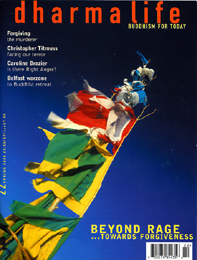Life is king
Zen and Philosophy
An Intellectual Biography of Nishida Kitaro Michiko Yusa
University of Hawai'i Press 2002
£24.50/$29.95 p/b
For those with neither the time nor the inclination to read the 350-page biography of Japanese philosopher Nishida Kitaro, this potted life story should suffice. 'As I look back on my life,' Nishida wrote on his retirement, 'I see that it has been quite a simple one. In the first half of it, I sat facing the blackboard. In the second half, I stood up with the blackboard behind me. I only changed my position in relation to the blackboard. This, in a nutshell, is my biography.'
Nishida's ironic reflection points to the fact that scholarship is not a spectator sport. Biographies of scholars tend either to be worthy but exceptionally dull reading, or else they avoid a serious encounter with the thinking of their subjects and dwell instead upon matters that are obviously crowd-pleasing: strange sexual proclivities, suggestions of insanity, or fraught political engagements. Michiko Yusa's biography is a rare thing: a biography of a thinker that retains a fidelity to its subject's thought, that is alive to the social, historical and political contexts in which that thought was born and nurtured, and that is a fascinating and compelling read.
Nishida was born in 1870. At the age of 21 he entered the Imperial University in Tokyo where he intensively studied both western and eastern philosophy. He was a diligent student but he found that mere study was unsatisfactory. 'I learnt a lot at the university,' he wrote, 'but there was no lecture that was truly informative or moving.' In 1895 he started to train in Zen practice, at the urging of his lifelong friend DT Suzuki. Nishida did not find the practice of Zen easy and he wrestled with the tensions between the life of scholarship and the practice of meditation. Eventually he realised that the resolution of this tension was not in the renunciation of his studies, but in the effort to, as he wrote in his diary towards the end of 1902, 'engage in studies while taking life as the basis'. This idea of life as the basis of both scholarship and also of Zen brought the two into a kind of unity.
Nishida's influence on Japanese thought was perhaps greater than any other philosopher in the 20th century. He was responsible for introducing the phenomenological method of Edmund Husserl to Japan - despite finding this system of thought 'too static and analytical' - and he also developed a sophisticated system of philosophy of his own, based upon what he called 'the logic of place'.
And yet his personal life was marked by an uncommon degree of personal sorrow: at one stage the philosopher Tanabe Hajime likened him to the biblical figure of Job. Nishida came to see that philosophy sprung not from wonder, as Aristotle claimed, but from 'the sorrows of life (jinsei no hiai)'. This personal tragedy became the impulse behind his thought, but it often found its clearest expression not in Nishida's philosophical works but in his waka, such as this one written on the death of his son.
Even the dirty textbooks
pronunciations pencilled in
are now treasures
I put them away
in a wooden box.
Nishida saw four of his seven children predecease him. 'I am in the depths of infinite loneliness and sorrow,' he wrote to a friend in 1945, the war raging about him. Sorrow, however, was not all, for in the same year he also wrote of how 'as I sink into the depth of myself, I find calm, infinite joy'. Nishida died on April 25th 1945. Four months later, the two atomic bombs were dropped on the cities of Hiroshima and Nagasaki, bringing the war to an end.
This biography not only provides the reader with an appreciation of Nishida's thinking, but also it points to how it might be to live a life passionately dedicated to thought. As Nishida wrote in his diary on approaching his 30th year: 'Scholarship is meaningful only when carried out for the sake of life. Life is of the utmost importance. Scholarship without recourse to life is useless.' Even at its most abstruse, Nishida's thought must be understood in this light.
Michiko Yusa's biography is itself a work of impressive scholarship, but its success lies in the fact that this scholarship, too, is carried out for the sake of life. Nishida was a private and self-effacing man. A man who can describe his life as merely a change in position relative to a blackboard would perhaps have been embarrassed to be the subject of such a detailed biography as this. Never-theless, beyond the embarrassment, he might have appreciated the carefulness of the thought, and the commitment to life, that runs through Michiko Yusa's fine book.
Will Buckingham is reviews editor of Dharma Life



